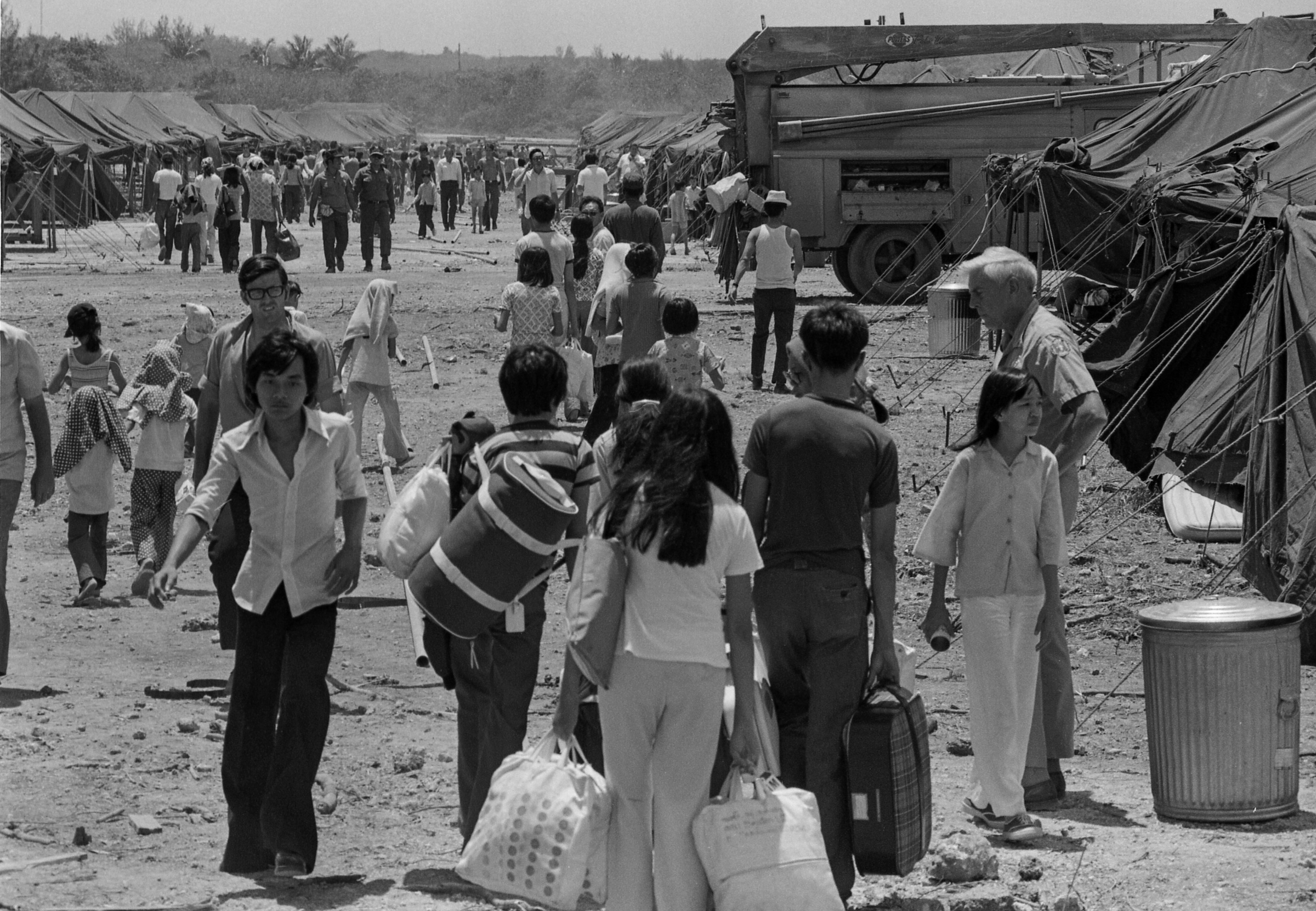
For Vietnamese-Americans, the plight of Afghan refugees today is all too similar
As the Taliban took over Kabul and all of Afghanistan, the scenes of desperate escapes were all too similar to those that followed the Vietnam War.
For many Vietnamese-Americans, the aftermath of President Joe Biden’s decision to withdraw all U.S. troops from Afghanistan after two decades of conflict is provoking painful memories of another two-decade war from half-century ago.
Since the Taliban seized Kabul, many refugees and their descendants have been describing their own dangerous escapes from Saigon and urging Biden to immediately let in as many Afghan refugees as possible.
Bearing witness to the struggle of Afghans is heart-wrenching for families who escaped Saigon.
Minh-Thu Pham, a board member of the Progressive Vietnamese American Organization (PIVOT), told NBC News that her community “knows the desperation, the loss of homeland and fear and panic they must be feeling.”
Taken Nov 1979 in Knoxville, TN after 8 mos in a #refugee camp in Indonesia (I’m in a borrowed plaid coat). Desperate, we fled #Vietnam by boat after my dad was released from re-education camp.
— Minh-Thu Pham (@M2Pham) August 17, 2021
Almost everyone welcomed us here. I wish the same for #refugees from #Afghanistan. https://t.co/1shs17PTvu pic.twitter.com/Zk89fcg7JG
Pham helped draft PIVOT’s official statement, calling on Biden to remove the cap on the number of Afghan refugee visas and Special Immigrant Visas (SIV). Pham’s father was fighting for the South Vietnamese army when Saigon collapsed. He was then sent to a re-education camp for many years before he was able to escape via boat.
“As the Vietnamese-American community has demonstrated, war refugees who are resettled in this country become valuable contributors to the life and culture of this great nation,” the statement read.
PIVOT is calling on the Biden administration and Congress to immediately take action. The organization outlined multiple steps to take, including removing the refugee cap and admitting SIV and P2 status refugees, authorizing adequate funding for resettlement purposes, and reaching out to allies to request that they also accept Afghan refugees.
The organization also wrote that the U.S. should make humanitarian concerns a top priority, especially for women and girls that were subjected to the harsh treatment by the Taliban.
Kham Moua, the director of national policy at the Southeast Asia Resource Action Center, told NBC News that the human rights crisis transpiring in Afghanistan is hauntingly similar to the U.S’s “chaotic exit” from Southeast Asia in the mid-1970s.
“There’s a large emphasis on Vietnam, but we saw the same scenes in Cambodia and Laos. We saw photos of people scrambling to get on planes and boats,” he said.
Moua said that the Biden administration shouldn’t focus solely on saving Afghans who directly assisted the U.S. during the war.
“As Southeast Asian refugees, we have seen the kind of impact U.S. military intervention can have in our countries. It goes far beyond the individuals who helped the military. It has a widespread impact on the population at large,” Moua said.
Most of the 1.2 million Southeast Asian refugees who eventually resettled in the U.S. arrived by boat in the late 1970s and 1980s. They paid incredibly large fees to cross the Pacific, and many were kidnapped, sexually assaulted and murdered.
RELATED CONTENT
Leaders from some of the most well-known members of the Vietnamese diaspora believe that the U.S. has a clear moral obligation to do much better for Afghan civilians.
Last weekend, Bee Nguyen, Georgia’s first Vietnamese-American state representative, shared a thread on Twitter, speaking on the long-lasting trauma of family separation that some of her loved ones experienced when they fled their homeland.
When Saigon fell in 1975, a portion of my family was evacuated immediately — my uncle worked for the U.S. embassy. Everyone else was left behind, including my parents. My dad and two uncles were swept up & imprisoned in “re-education camp,” where they were starved & more.
— Bee Nguyen (@BeeForGeorgia) August 15, 2021
“I pray that our Afghan allies and partners make it out alive and have the chance to rebuild their lives, the same way my family was able to. We owe it to them,” she wrote.
Pulitzer Prize-winning author Viet Thanh Nguyen also took to Twitter to voice his thoughts on the matter, saying that civilians from Laos and Vietnam were evacuating their homelands more than a decade after the war ended.
“The American obligation to the Afghans who wish to leave will remain for years too. Nothing ends for Afghans with the departure of the last American,” Nguyen wrote.
Vietnamese-American refugee Thanh Duong, who scaled the 14-foot wall of the U.S. Embassy in Saigon in April 1975, told NBC News of his journey and the emotions the current crisis in Afghanistan is stirring up within him and many others.
Duong was a civil engineer for the South Vietnamese government and had collaborated with Americans during the Vietnam War. He climbed the embassy as a last resort, after exhausting every other option, such as searching for a boat, seeking help from the U.S. Agency for International Development, and finding shelter in shuttered military housing.
He was finally able to escape through the help of U.S. reporters, who let him inside the building, where he anxiously awaited for hours until he was airlifted out of the country by a military helicopter.
When Duong watched the viral video of desperate Afghans clinging onto a U.S. military jet, Duong began reliving “one of the worst days” of his life.
“When I saw the scenes from the news from pictures and videos,” he said, “I was just devastated. It’s complete chaos, just as it was in 1975.”











LEAVE A COMMENT:
Join the discussion! Leave a comment.